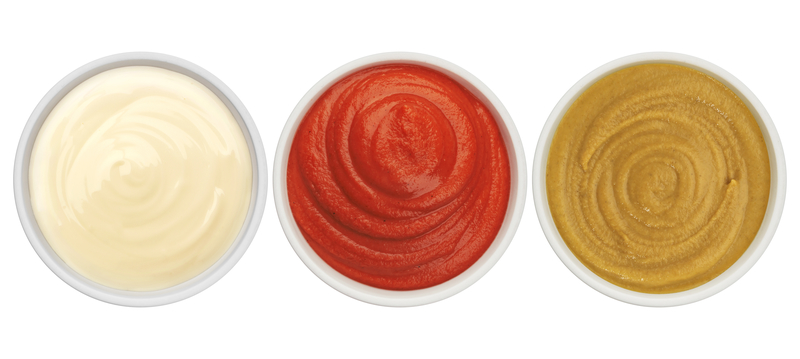What are the Healthiest Condiments? (And 3 You Should Avoid)

Sometimes it isn’t as easy to slap a label on something and call it healthy or unhealthy as it is to put things in a hierarchy and classify them as good –> better –> best or best to worst. When it comes to healthiest condiments, this is especially true because you have to take into account flavor combinations, hidden dangers, and even health benefits.
One example that comes to mind is ketchup. If I had to put things in black and white and list condiments in terms of good or bad, unfortunately, ketchup would end up on the bad list. One might argue that ketchup is made from a fruit/vegetable—the tomato—and therefore should be “healthy,” but not so fast.
Most commercial ketchup includes one of the worst ingredients on the planet: high fructose corn syrup. Yet you can also make your own homemade ketchup with a few simple ingredients, such as tomato paste, apple cider vinegar, garlic, and onion. Ground chia seeds make for an excellent thickening agent to create the right texture and increase the nutrition value.
Much like ketchup, commercial barbecue sauces also contain a lot of sugars when they don’t need to. You can also create a healthy and delicious barbecue sauce using similar ingredients as the ketchup recipe. Heck, you could even make a ketchup base then add spices and some Worcestershire sauce and voila! Check out the following article for one of my creations: Healthiest BBQ Foods for your Waistline.
Mayonnaise is another tricky one. Commercial mayonnaise includes egg yolks, vegetable oil, lemon juice, and apple cider vinegar. You can make your own using avocado oil (or even an avocado), which will lower your omega-6 while still providing more of the heart-healthy monounsaturated fats. By adding spices and seasonings to these concoctions, you can add a ton of flavor without sacrificing your health.
The following are the macronutrient breakdowns of some of the most popular condiments, listed in order of best to worst. And again, this isn’t to say the lower end of the spectrum is inherently bad, but you may want to stick closer to the top of the list or choose to make your own healthier version at home.
The Healthiest Condiments For You
Dill pickle relish (1 Tbsp)
- 0 calories
- 0 g fat
- 0 g carbohydrates
- 0 g protein
Hot Sauce (1 Tbsp)
- 1 calorie
- 0 g fat
- 0 g carbohydrates
- 0 g protein
Salsa (1 Tbsp)
- 4 calories
- 0 g fat
- 1 g carbohydrates
- 0 g protein
Horseradish (1 Tbsp)
- 7 calories
- 0 g fat
- 3 g carbohydrates
- 0 g protein
Yellow Mustard (1 Tbsp)
- 12 calories
- 0 g fat
- 3 g carbohydrates
- 0 g protein
Sauerkraut (100 g)
- 19 calories
- 0 g fat
- 4 g carbohydrates
- 1 g protein
Hummus (1 Tbsp)
- 23 calories
- 1 g fat
- 2 g carbohydrates
- 1 g protein
Avocado/Guacamole (1 Tbsp)
- 35 calories
- 3 g fat
- 2 g carbohydrates
- 0 g protein
Plain Greek yogurt (100 grams)
- 59 calories
- .4 g fat
- 3.6 g carbohydrate
- 10 g protein
Sour Cream (1 Tbsp)
- 22 calories
- 2 g fat
- 0 g carbohydrates
- 0 g protein
Barbecue Sauce (1 Tbsp)
- 22 calories
- 0 g fat
- 5 g carbohydrates
- 0 g protein
Sweet pickle relish (1 Tbsp)
- 20 calories
- 0 g fat
- 5 g carbohydrates
- 0 g protein
Cream Cheese (1 Tbsp)
- 65 calories
- 6 g fat
- 2 g carbohydrates
- 1 g protein
Butter (1 Tbsp)
- 70 calories
- 8 g fat
- 0 g carbohydrates
- 0 g protein
3 Condiments you May Want to Avoid
Ketchup (1 Tbsp)
- 19 calories
- 0 g fat
- 4 g carbohydrates
- .2 g protein
Mayonnaise (1 Tbsp)
- 90 calories
- 10 g fat
- 0 g carbohydrates
- 0 g protein
Ranch Dressing (1 Tbsp)
- 73 calories
- 8 g fat
- 1 g carbohydrates
- 0 g protein
Healthiest Condiments: A Recap
Your favorite brand may vary from the Nutrition Facts above. But remember, the healthiest condiments ARE NOT just about the numbers. It’s also about the ingredients. Watch for condiments that contain not only high fructose corn syrup but added sugars of any kind, refined vegetable oils (like safflower, sunflower, corn, etc.), shortening, preservatives like sodium benzoate and potassium benzoate, BHA, artificial colors and sweeteners, MSG, nitrates, and excessive sodium/salt.



 7 Signs Your Body is Seriously Low on Collagen (not just wrinkles)
7 Signs Your Body is Seriously Low on Collagen (not just wrinkles) Health Expert: "Turmeric Doesn't Work (unless...)"
Health Expert: "Turmeric Doesn't Work (unless...)" 3 Warning Signs Your Probiotic Supplement is a Total Waste
3 Warning Signs Your Probiotic Supplement is a Total Waste

